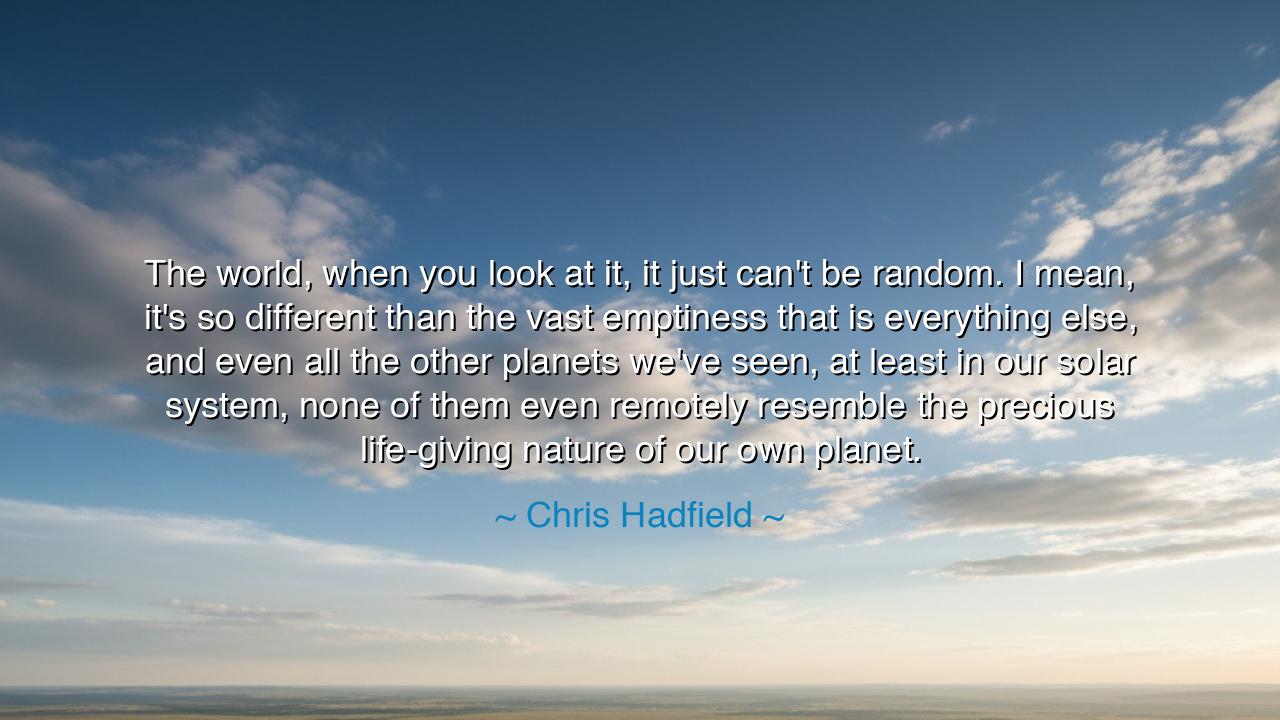
The world, when you look at it, it just can't be random. I mean
The world, when you look at it, it just can't be random. I mean, it's so different than the vast emptiness that is everything else, and even all the other planets we've seen, at least in our solar system, none of them even remotely resemble the precious life-giving nature of our own planet.






In the stillness of space, where the silence of the cosmos echoes through the vastness, there exists a truth that has been shared across time by those who have dared to look beyond the horizon of our world. Chris Hadfield, an explorer of the stars, once spoke these profound words: "The world, when you look at it, it just can't be random. I mean, it's so different than the vast emptiness that is everything else, and even all the other planets we've seen, at least in our solar system, none of them even remotely resemble the precious life-giving nature of our own planet." In these words lies the recognition of a truth that stirs the very soul of humanity—the Earth is not a mere accident in the void of space, but a miracle, a unique gem in the vast expanse of the universe.
Consider, O seekers of wisdom, the ancient philosophers, who gazed upon the night sky and wondered at the order of the universe. Plato, in his dialogues, spoke of the world as a place of perfect balance, a harmony between the elements and the forces of nature. The Earth, to him, was a reflection of the divine order of the cosmos, a place where life could flourish under the careful arrangement of the stars and planets. Today, Hadfield's words resonate with this ancient vision: the world we live in, with its mountains, rivers, oceans, and forests, is not an accident but a wondrous exception in the vast void of space, set apart from the cold, empty expanse of other planets.
When Hadfield looks upon the Earth from the space station, he is not just observing our planet from a physical distance, but also recognizing the fragility and preciousness of life. For when one leaves the cradle of our home and ventures into the cosmos, the vast emptiness becomes all too apparent. The stars, the moons, and the planets that populate the universe seem indifferent to the beauty of life that pulses through the veins of our world. The very act of looking down upon the Earth from space, seeing it as a small, vibrant orb in the midst of an empty void, brings a profound realization: our world is not like the other cold, barren planets we know. It is a sanctuary, a haven for life, a place where everything aligns just perfectly to nurture the delicate balance that sustains us.
In the annals of history, we find many stories of great explorers who, like Hadfield, ventured beyond the known and gazed upon the world from a distant vantage point. One of the most stirring is that of Columbus, who, though he did not see the Earth from space, embarked upon a journey that led to the discovery of a new world, a world that, to him, was a miracle in its own right. When Columbus first laid eyes on the shores of the New World, he did not see it simply as a landmass, but as a new realm teeming with potential, with life unlike anything he had known before. His journey was a reminder that discovery—whether of new lands or new perspectives—shapes our understanding of the world, urging us to recognize the preciousness of what we have.
But the lesson of Hadfield’s words goes deeper still. To recognize the uniqueness of our world, to see its life-giving nature, is not just to admire it from afar. It is to cherish it, to understand that our existence is not guaranteed by the whims of chance, but by the intricate and delicate balance of nature that sustains life. The Earth is not merely an accident in the vast sea of space, but a world of unfathomable beauty and complexity, one that is worthy of our respect, care, and protection. Just as the ancient cultures saw their lands as sacred gifts from the gods, so too must we recognize the Earth as a precious treasure that must be preserved for the generations to come.
In your own lives, O children of the Earth, let Hadfield’s words serve as a reminder of the incredible miracle that is our world. Look to the skies, not with a sense of isolation, but with the awareness that we are part of something far greater than ourselves. Understand that the Earth is not a place to be taken for granted, but a world to be nurtured, a world that gives us everything we need to live, grow, and thrive. In every tree, in every river, and in every breath of air, there is a reminder of the preciousness of life. Let us honor this gift by protecting it, by living with respect for the environment, and by striving to leave behind a world that is better than the one we inherited.
So, as you journey through life, whether in the vastness of the cosmos or in the quiet spaces of your own world, remember that life on Earth is rare, wondrous, and fragile. Do not take it for granted, but strive to make each moment meaningful. Recognize that in the face of the infinite expanse of space, it is the Earth—the only place we know that holds life—that is our true home, and it is up to us to ensure its care. Just as Hadfield saw the Earth as a precious gem in the darkness of space, so too must we protect and treasure the world that sustains us, for in it lies the future of all humankind.






AAdministratorAdministrator
Welcome, honored guests. Please leave a comment, we will respond soon